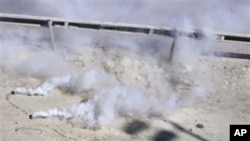Britain's Prime Minister David Cameron says he would like to see a United Nations resolution condemning Libya's use of force against anti-government protesters. He was speaking in Qatar during a tour of Gulf Arab states. Back in Britain, controversy has arisen over his country's sale of arms to what critics call repressive governments.
Speaking in Qatar, Mr. Cameron described the force used by the Libyan government to crack down on its opponents as "appalling."
On Tuesday, the United Nations Security Council issued a statement condemning the use of force against civilians in Libya.
Cameron said more should be done.
"Would I like us to go further and have a full United Nations Security Council resolution? Yes, I would, I think that would be good," said Cameron.
Mr. Cameron is in the Gulf along with a team of senior defense manufacturers.
The 10th International Defense Exhibition, or IDEX, is taking place in Abu Dhabi with more than 1,000 companies showing their military equipment and services.
Among them are a number of major British companies.
Wyn Rees is an international security expert at Britain's Durham University. He says Britain's defense manufacturers are some of the top globally and are keen to make sales.
"We're currently in times of financial austerity and arms companies earn this country large overseas balance of payments, so with the amount of money we spend domestically on defense squeezed very hard, there's going to be continued pressure from big defense manufacturers to continue selling items of equipment, the argument being you can only develop these sorts of high ticket price items domestically if you have also got overseas markets in which to sell them to," said Rees.
But in Britain, critics say the British government is hypocritical for arming those same governments it criticizes.
Britain has this week revoked licenses for arms sales to Libya and Bahrain after fears surfaced that British tear gas or riot equipment may have been used against political demonstrators.
It has also emerged that security forces from Libya and Bahrain have been trained in the United Kingdom.
Keith Hartley is from the Centre for Defense Economics at Britain's University of York.
He says the Gulf Arab states need international arms to defend themselves.
"They live in an uncertain world," said Hartley. "They are surrounded quite often by some neighboring states that they regard as potential enemies and rivals. You simply have to mention Iran for example, others feel a threat from Israel. So it's not surprising that they are reasonably heavily armed."
He says the United Nations would need to play a stronger role if those countries were not to be armed.
"It would be a far better world if we had an effective United Nations that could in actual fact introduce, police and enforce peace in the Middle East and elsewhere and enforce it by having the equivalent of a world military force - but that doesn't exist, and I think we're a long way from it," added Hartley.
Britain has licensed hundreds of cartridges of tear gas and other riot equipment for sale to Bahrain within the past nine months.












